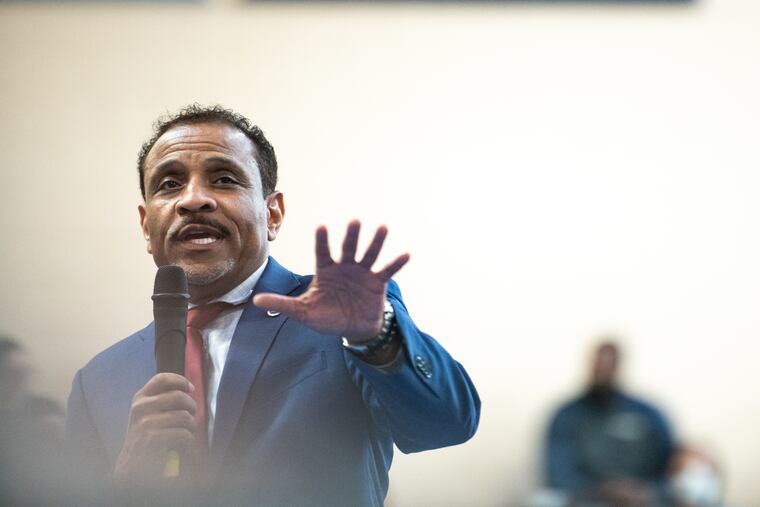Watlington’s plans for Philadelphia schools could help transform education — and the city itself | Editorial
At the start of his third school year, Superintendent Tony B. Watlington Sr. is overseeing important curriculum changes and the promise of year-round school.

The Philadelphia School District is not the easiest institution to change. With a $4.5 billion budget, 331 public and public charter schools, nearly 200,000 students, and more than 18,000 staff members, implementing change in the district is like trying to turn a battleship around.
But in a recent interview with the Editorial Board, Superintendent Tony B. Watlington Sr. showed promise that after a slow start, he is ready to steer Philadelphia’s schools in the right direction.
When Watlington first came to town, many — including this board — reacted with an understandable sense of skepticism. Watlington, after all, was an outsider coming into an exceedingly insular city without the benefit of much experience leading a school system comparable in size to Philadelphia’s. Besides, the district has seen many superintendents come and go, and their departures have sometimes been acrimonious.
At the start of his third school year, however, Watlington’s position looks stronger. He’s overseen changes in the math curriculum and is deploying a new reading curriculum this year. There’s a laser focus on teacher recruitment and retention, an understanding of the district’s role in promoting health and safety, and a clearer vision of what year-round school will look like — and what it could mean for working parents and the city. There’s also important political and financial backing in Harrisburg and City Hall.
If Watlington can make good on these investments, it could help transform Philadelphia.
» READ MORE: Philadelphia students deserve safe schools | Editorial
Last school year, the district began using Illustrative Math, a teaching method that advocates say better prepares children for more advanced forms of mathematics. While some instructors have expressed doubts, Watlington insists that most teachers in Philadelphia schools have embraced it, and he takes accountability for any hiccups during its rollout. The superintendent also noted that the curriculum is used in Singapore, which is consistently one of the leaders in international standardized testing in math.
A crucial factor in implementing standardized curriculums is ensuring the city’s most transient students don’t get left behind by consistently shifting coursework, Watlington said, a lesson he took from former Superintendent Constance Clayton.
Watlington’s experience in rolling out a new math curriculum will hopefully smooth the implementation of the district’s new science of reading-based literacy programs. While the culture war over reading has dominated the debate about public education in suburban districts, many parents with children enrolled in city schools are less likely to be able to access resources like reading tutors. Shifting all students toward an evidence-based reading program was long overdue.
Also refreshing is Watlington’s focus on anticipating future challenges.
While the district has filled 96% of teaching positions, there’s a growing teacher shortage in Pennsylvania. Alongside state leaders and union officials, Watlington is pushing for new pipelines into the field. The district is helping its own employees in nonteaching roles become licensed teachers free of cost. Their extensive experience in schools will be invaluable when they begin their new roles. Watlington has also lobbied Harrisburg to ease the process of transferring an out-of-state teaching license to Pennsylvania.
Even with important changes in curriculum, the year-round school pilot program — a priority for Mayor Cherelle L. Parker — might be what defines Watlington’s legacy.
To hear the superintendent describe his plans for schools in the program, they seem as much like traditional places of learning as they do hubs of neighborhood activity. At 20 elementary schools this year, students will be able to stay in a supervised, supportive, and enriching environment before and after school, as well as during the summer, winter, and spring breaks. The potential benefits of those proposals are enormous.
Changing the school calendar itself would be an arduous undertaking, but providing before and after-school activities makes a lot of sense. For working parents, this initiative has the potential to save thousands of dollars per year in aftercare and summer camp costs. For some, it may provide a justification to stick with city schools rather than moving to the suburbs. Given the sharp rise in homicide rates among young people after the pandemic closed city schools, providing safe spaces for children is a civic priority.
» READ MORE: I met Philly schools’ superintendent at Whole Foods. As a teacher, I can’t afford to shop there. | Opinion
Of course, there are reasonable questions around the program. How much it will cost and how service providers are selected are important factors in whether this can become the large-scale program the city needs, or if it’ll become yet another failed pilot.
Watlington, the first superintendent hired to lead the district since it emerged from the purview of the Harrisburg-led School Reform Commission in 2018, owes much of his freedom to act to others. William R. Hite Jr., who led the district for six of the 17 years it was under state control, helped ensure Philadelphia schools would be on firmer financial footing.
A determined group of lawyers and advocates won a landmark case in February 2023 declaring Pennsylvania’s inadequate state support for education unconstitutional. Gov. Josh Shapiro and the first Democratic House majority in Harrisburg in over a decade secured substantial funding increases (even as they fell short of what advocates sought), and Mayor Parker and City Council have once again shifted more property tax revenues toward the school district.
This perfect storm has left the district in the rare position of having the wind at its back. It is up to Watlington to set the right course and build a school system that makes good on the Pennsylvania Constitution’s promise of a “thorough and efficient” education for all students.